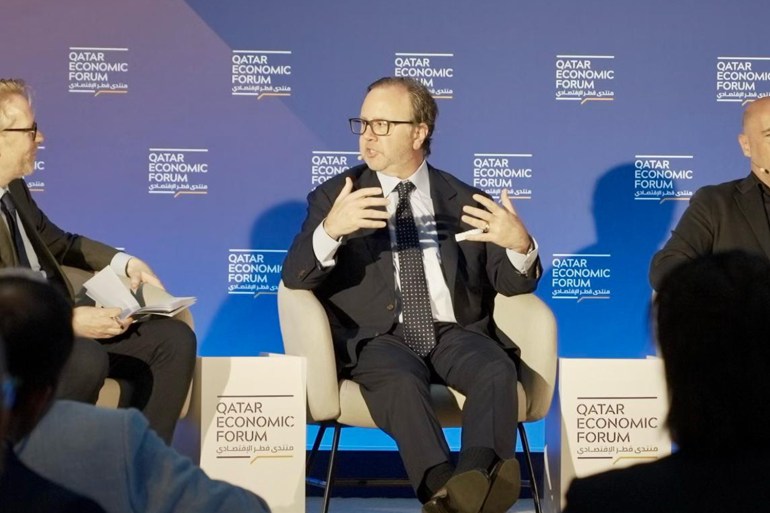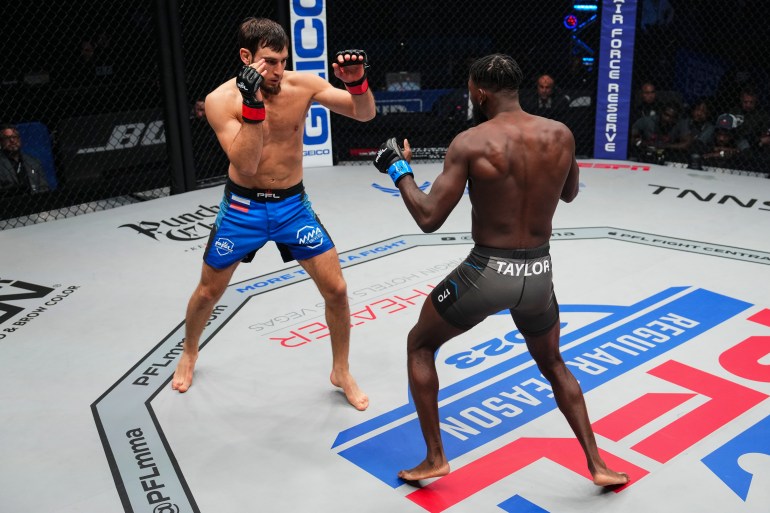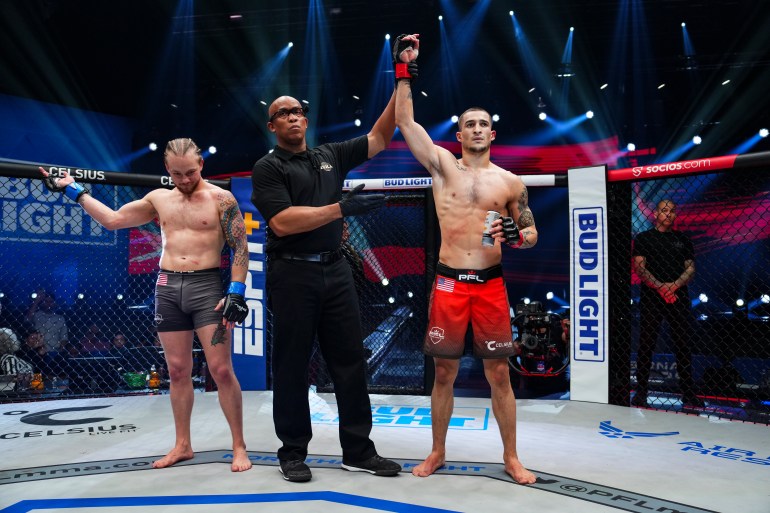The Cameroonian became the latest – and biggest – name added to the roster of the PFL, which claims to be the number two MMA company in the world after UFC. US Olympic judo gold medallist Kayla Harrison and former UFC champion Anthony Pettis, as well as Biaggio Ali Walsh, grandson of Muhammad Ali, are also fighting in the promotion.
In an exclusive interview with Al Jazeera, the PFL’s founder and Chairman Donn Davis has revealed lofty ambitions that include the formation of regional leagues and a league of champions where the best regional fighters will compete for the top spot. The interview below has been lightly edited for brevity and clarity.
Al Jazeera: What are your plans for expansion into the Middle East? Why is the region an attractive prospect for MMA and the PFL?
Donn Davis: PFL is global. We have fighters from 30 countries and our fights are broadcast to 150 countries. But now, we want to take the PFL to the fans. If you look at football, there are 10 major leagues around the world because fans want their own heroes, their own athletes and to see them at their own prime time.
PFL Africa is going to be the first major company to do it.
We would also like to launch in the Middle East with the best local fighters – all the events in the region, at local prime time, on streaming and broadcast.
This whole initiative is to be the Champions League of MMA. Local heroes, local pride. The winners of each of these regional leagues get to compete against each other and the very best move up to PFL Global.
It will create the first global system for mixed martial arts. So PFL wants eight such regional leagues, and would like the Middle East to be the second or third league in the network because this region loves combat sports and has a lot of economic support for it.
Al Jazeera: Are you just planning to hold events in Gulf countries or in other places in the region, too?
Davis: We are not sure yet, but like most growing companies, we test and refine. The Gulf region can support its own powerful Middle East league.
Al Jazeera: What is your plan for PFL Africa and how will Ngannou fit into that?
Davis: He will play multiple roles. He will fight on our pay-per-view division; be part of our global athlete advisory board to help make sure we are the best place for fighters; and as chairman of PFL Africa, play a very hands-on role in building that company and recruiting fighters. He knows what it takes [to be a fighter].
In addition, he will bring media companies and sponsors to the table as he is also a dynamic leader, not just a great fighter.
As for our plans for Africa, we are going to move up our Africa launch by a full year. We are slated for 2027 but we will announce it for 2025, with four events and a full season.
It will be the sports season format – win and advance, lose and go home.

Al Jazeera: Which countries do you have in mind?
Davis: It is still too early to say but what we have learned from Europe that we are able to recruit the best fighters because of not just the opportunity, but the control. They know that if they win, there’s a real path. They’re going to be global.
Al Jazeera: What do you make of [UFC boss] Dana White’s comments that Ngannou’s PFL contract “doesn’t make sense” and that Ngannou is avoiding risk and won’t face any tough opponents in the PFL?
Davis: I think Francis answered those pretty well. I think if there’s any human on the planet who’s taken risk, it’s Francis. It took him two years to walk across the desert to establish his life. That man has taken some risks.
In terms of the UFC – of course, what we did makes no sense to him [White]. Leaders have their way of doing business.
New companies get built all the time. They are creative, innovative and tend to think differently about opportunities in the market. If all big companies were smart, nimble, no new companies would ever get built. So of course, big companies think that a new little company is not doing things right.
Al Jazeera: Former UFC champion Conor McGregor also said, “Who’s he [Ngannou] going to fight? Who’s he going to fight that’s going to capture the general public? There’s no one. There’s no matchup that I can even think of, that I can even say to myself that is going to do big.” How would you respond to his comments?
Davis: People have to wait and see – they will be surprised. They will have to take back their comments.
As for Francis’s legacy, 10 years from now, nobody will remember who Francis fought next.
But they will remember that he was the one who changed MMA for every single fighter because he showed them they had an option, that he made more money in MMA than any other fighter, he opened up the entire continent of Africa for other fighters.
They will remember he did way more than any of them, and not who he fought next.
Al Jazeera: Who would you like his first fight to be against?
Davis: It is not something Francis is worried about.
We have a year [to decide]. Great fighters and great matchups emerge all the time.
Al Jazeera: Many people would love to see Ngannou v current UFC heavyweight champion Jon Jones – is there any ambition to sign Jones and make that happen?
Davis: We think as a fan first so we are willing to do anything that is good for fans as it is good for business eventually.
We would promote any fight.
If Jon Jones and UFC want to fight Francis, we would promote that fight. If there is a fight the fans want to see, we’ll do it.
Al Jazeera: In terms of the rest of the roster and in the interests of transparency, what kind of percentage of PFL’s revenue do your fighters make?
Davis: As a private company, we haven’t disclosed that, but what we have disclosed is that our pay-per-view division will split revenue 50-50. Not just profits, revenue – and we have been very public about it.
When you pay as a consumer for pay-per-view, you’re paying to watch those fighters.
The UFC or PFL brands are secondary to the two main fighters. We think that’s a fair model in pay-per-view, and that’s a model that we’re committed to in our pay-per-view super division.
Al Jazeera: Is there any truth to the reports that you would like to buy MMA promotion Bellator?
Davis: I can’t comment on something we may or may not be working on.
Al Jazeera: You say that PFL is the second MMA production in the world, but ONE Championship is arguably the second-biggest combat sports organisation after the UFC and recently held its first event in the US. ONE also intends to build its presence in the Middle East. How concerned are you about its growth and ambitions?
Davis: There are only four metrics you would measure any sports league by: The percentage of athletes in terms of their ranking, viewership, revenue or the amount of paid distribution.
On all four of those metrics, PFL is number two in the world.
I can’t comment on other people’s claims, but those are the facts that make PFL the number two MMA company in the world.
Our goal is exceeding on our business plan and we don’t have any worries about where other people are.
In just five years, we’ve gained this market position and this fan following and have become the preferred destination for top fighters in the world. I think we’ve proven what we can do to our media partners and to our fans, and most importantly, to fighters.
Francis chose PFL. Jake Paul chose PFL. Most of the fighters leaving UFC chose PFL.

Al Jazeera: What’s the ultimate aim for PFL – is it to challenge the UFC’s supremacy? Is that feasible, especially in light of their level of dominance, their revenue, their status in the US and their recent merger with WWE? How does the PFL achieve that? What can PFL do that the UFC can’t?
Davis: The UFC is the clear number one company. But the MMA market is very big and the fans are underserved.
There are 600 million MMA fans and UFC provides only 40 events a year. There will be a second very big company globally. This market is big enough for at least two big companies. PFL is the number two today and we’d like to be the co-leader.
Five years ago we had zero fighters, zero employees and zero viewers. Over the next five years, we would like to become the co-leaders because this market is big enough for more than one [leader].
Al Jazeera: How are you planning to recruit fighters in Africa and the Middle East?
Davis: We have a database of about 30,000 fighters. We have hired some of the best people that did Moneyball out of baseball and created a system of identifying talent, including human scouting which we use for athletes at the top level.
But for people in Africa, India and Asia in general, we need to identify fighters early and we have a database that does it. We have roughly 50 prospects in Africa that we’re interested in. It’s for a league that’s a year and a half away.
Our advantage is we use technology more than others and borrow systems from other sports.

Al Jazeera: What sort of support do fighters in the Middle East and Africa need and how are you planning to provide it in order to develop successful leagues?
Davis: We think the biggest thing that we can do is create the Africa and Middle East leagues as it will create a real path.
In addition, develop and promote local fighters. They can be on prime time broadcast with the premium partners regionally. They can get paid more, which allows them to have better training, better coaches and maybe give up a second job for a while.
The only way to do it is to be persistent and structural. If you export one big fight, like the UFC does to the region once a year, that’s like coming in and leaving. You’re bringing awareness, but you’re not structurally developing.

Al Jazeera: With the high costs of mobile broadband in Africa, and sport’s reliance on social media, how are you going to overcome the challenges that these regions pose in terms of building a successful brand?
Davis: In emerging countries the consumption of sports gets better as the bandwidth costs get more accessible for more people. The biggest issue is most premium sports are behind a double paywall – you pay for a subscription, then you pay more for a premium subscription.
Today, the UFC can be seen by less than 5 percent of people in Africa or India. That’s a real barrier. So our goal with PFL Africa is to create more free-to-watch content.
Fans will have bandwidth costs but won’t have additional costs.
Our goal is to have 50 percent of Africa be able to watch PFL Africa.
Al Jazeera: In terms of streaming, will it be free to watch?
Davis: That is the plan we are working on.
Al Jazeera: You have mentioned India as a potential market, but how do you penetrate into a cricket-crazy market and make it work?
Davis: All countries need more than one sport. Europe is football-crazy and yet MMA is fastest growing in Europe.
Everybody’s got something that they love.
What I think is so promising about MMA in India is, cricket and what else? Cricket is long and MMA is 15 minutes. What is better on your mobile phone in a 15-minute moment?
So if you ask me, 20 years from now, I think India will be the biggest market for MMA in the world.
If you look at delivery on mobile, if you look at the installed fan base now, it’s going to take 20 years but it will be the number one sport.
The only country that could possibly challenge it is China.
So 20 years from now, one of India or China will be the number one MMA-consuming nation.
